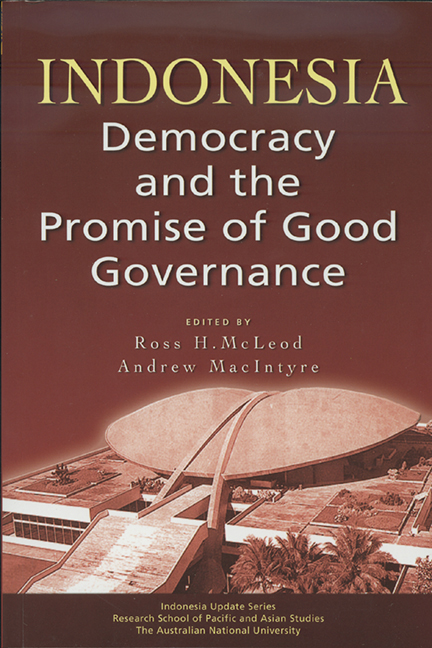Book contents
- Frontmatter
- Contents
- List of Tables and Figures
- List of Contributors
- Acknowledgments
- Glossary
- 1 Introduction
- PART I FORMING AND REFORMING THE ARCHITECTURE of GOVERNANCE
- PART II THE ROLES OF GOVERNMENT
- 5 The State and the Market in Democratic Indonesia
- 6 Government and Private Business: Rents, Representation and Collective Action
- 7 Muslim Politics in Indonesia's Democratisation: The Religious Majority and the Rights of Minorities in the Post-New Order Era
- 8 Children, Welfare and Protection: A New Policy Framework?
- PART III THE INSTITUTIONS OF GOVERNMENT
- Index
- INDONESIA UPDATE SERIES
5 - The State and the Market in Democratic Indonesia
from PART II - THE ROLES OF GOVERNMENT
Published online by Cambridge University Press: 21 October 2015
- Frontmatter
- Contents
- List of Tables and Figures
- List of Contributors
- Acknowledgments
- Glossary
- 1 Introduction
- PART I FORMING AND REFORMING THE ARCHITECTURE of GOVERNANCE
- PART II THE ROLES OF GOVERNMENT
- 5 The State and the Market in Democratic Indonesia
- 6 Government and Private Business: Rents, Representation and Collective Action
- 7 Muslim Politics in Indonesia's Democratisation: The Religious Majority and the Rights of Minorities in the Post-New Order Era
- 8 Children, Welfare and Protection: A New Policy Framework?
- PART III THE INSTITUTIONS OF GOVERNMENT
- Index
- INDONESIA UPDATE SERIES
Summary
It must be remembered that there is nothing more difficult to plan, more doubtful of success, nor more dangerous to manage, than the creation of a new system. For the initiator has the enmity of all who would profit by the preservation of the old institutions and merely lukewarm defenders in those who would gain by the new ones. (Machiavelli, 1469–1527)
INTRODUCTION
Indonesia's economic performance has been significantly less impressive in the democratic (post-Soeharto) era than previously. The key indicator is the average annual rate of output growth, which not only reflects general improvements in living standards but is also by far the most important factor in reducing poverty. The rate of output growth over the three decades of the New Order regime (through 1997) was 7.4 per cent, but since the turn of the century (marking the start of the period of recovery from the economic crisis) it has been more than one-third lower, at 4.7 per cent (Figure 5.1). In terms of growth rates of per capita income, the decline has been even larger. From an economic point of view, it is this decline in economic performance that demands that we speak only of democracy's promise of good governance in Indonesia; it is a promise yet to be fulfilled.
We seek explanations for the decline in Indonesia's economic performance in the literature on new institutional economics. Writers in this field suggest that poor public sector governance, resulting in slow or no growth and development in many developing countries, is largely due to the lack of an appropriate set of the institutions critical to economic growth and development–or to lack of enforcement of those institutions. In this literature, ‘institutions’ are defined broadly as constraints devised to provide a structure for political, economic and social interactions (North 1991). Since this rather abstract definition differs from everyday use of the term–note, in particular, that institutions are distinguished from organisations–we begin by elaborating North's concept in more detail.
- Type
- Chapter
- Information
- IndonesiaDemocracy and the Promise of Good Governance, pp. 73 - 92Publisher: ISEAS–Yusof Ishak InstitutePrint publication year: 2007



